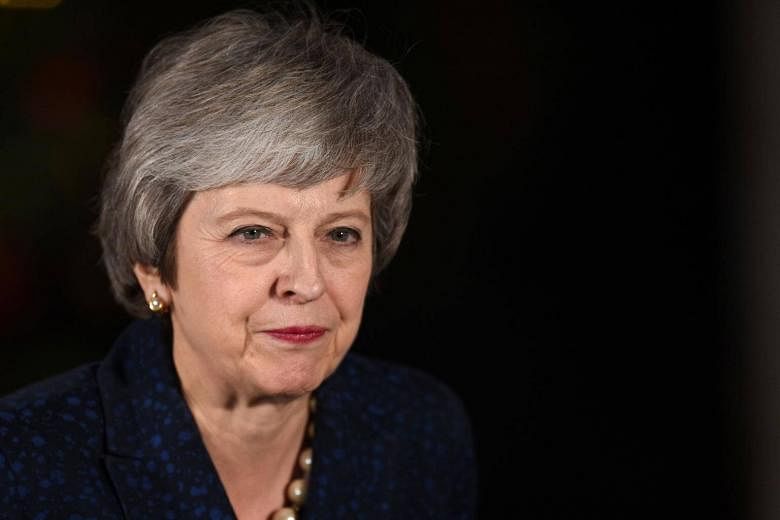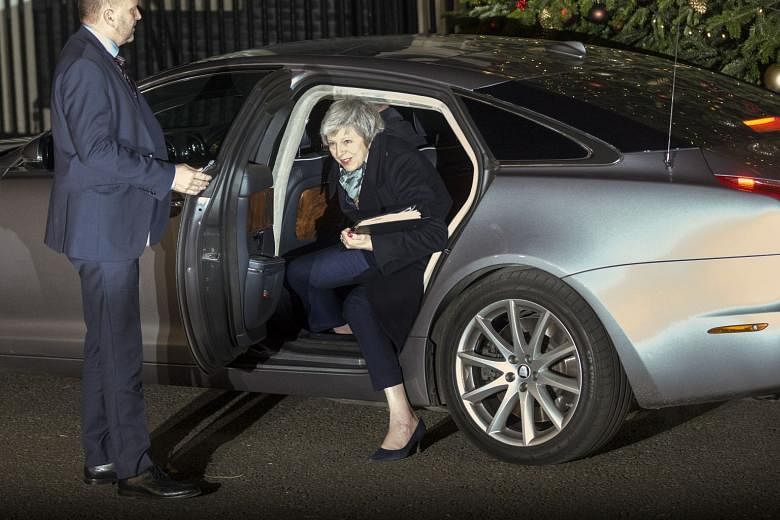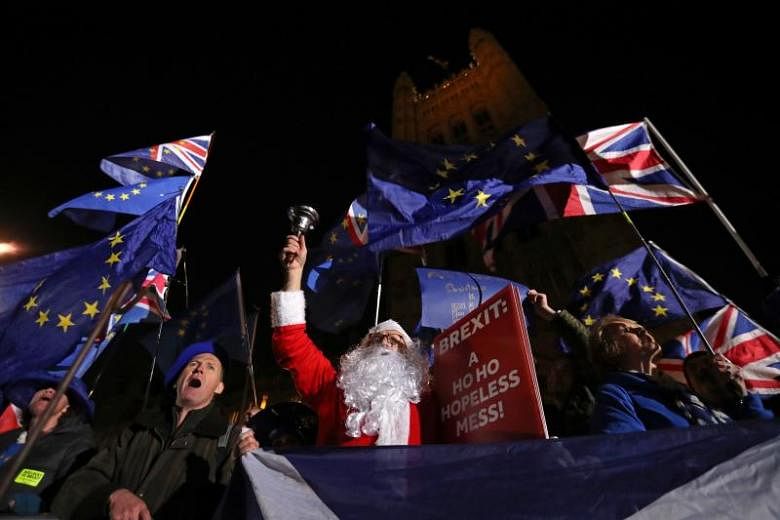LONDON (BLOOMBERG) - Mrs Theresa May survived an attempt to oust her as British prime minister on Wednesday (Dec 12), strengthening her position as she seeks to secure a deal for Britain to exit the European Union in March.
Mrs May won a vote of confidence in her leadership of the Conservative Party, with Tory members of Parliament backing her by 200 to 117 in the secret ballot.
The result means Mrs May's enemies cannot try again to oust her as party leader for at least a year.
The pound, which had risen in advance of the vote, pared gains because of the tighter-than-expected margin of victory.
Even so, Mrs May's victory came at a price. In an emotional concession during a private meeting with her critics, she said she knew deep down she would not be leading them into the next election in 2022, according to people in the room.
Her plea was to be allowed to steer the United Kingdom through Brexit.
"She said that in her heart she'd love to fight the next election, but she knows that she can't," Health Secretary Matt Hancock told Sky News.
"She was quite emotional about that."
Another Cabinet minister, who declined to be named, said Mrs May's gambit was a necessary compromise to reassure her critics that she won't go on and on as leader.
While the question over Mrs May's immediate future is now settled, it is likely to be only a temporary reprieve for the embattled premier.
She is facing hardened opposition in Parliament to the Brexit agreement she negotiated with the EU, and her attempts to get better terms have so far fallen flat.
Still Against Her
"It doesn't matter that she's won," said pro-Brexit Tory Marcus Fysh.
"She can't command the DUP and that leads to a vote of confidence in the government, a near-term general election," he said, referring to the smaller Northern Irish party that props up Mrs May's government.
"We're not going to back her deal, so in practice she can't carry on," Mr Fysh said.
If Mrs May cannot get her exit terms through Parliament, the UK will be on course for a no-deal Brexit, risking economic and political upheaval.
The main opposition Labour Party is weighing up whether to push for a general election by triggering a formal vote of no confidence in the government. Ironically, Mrs May's victory over her internal Tory critics on Wednesday could make her more vulnerable to such a challenge.
Eurosceptic Conservatives have few options left in their campaign to install a more pro-Brexit prime minister who will deliver the decisive split with the EU they want.
It is possible they would now back a Labour motion of no confidence in the government, potentially bringing down the entire administration.
It would only take a handful of Tories to vote against her to do so.
Time Running Out
With just over three months before the country leaves the EU, Mrs May's Tory opponents triggered Wednesday's "no confidence" vote because they want to block her plan for staying close to the EU's trade rules.
Mrs May came out fighting with a statement outside her Downing Street office an hour after the confidence vote was announced.
She then took on Labour Leader Jeremy Corbyn during a noisy session of prime minister's questions in the House of Commons.
At 5pm, it was time for Mrs May to face her own party. At a meeting of the so-called 1922 Committee of Tory politicians, she asked them to give her time to finish the job of taking Britain out of the EU.
Mrs May addressed the key questions on many of her critics' minds: If she isn't forced out now, would she try to stay on and lead the party into the next general election, slated for 2022? And could she call an election earlier as a way to get break the deadlock in Parliament over Brexit?
Mechanical
Last year, Mrs May's mechanical style and poor campaign strategy were blamed for costing the Tories the majority they had. Many members of the party want to ensure she doesn't get the chance to repeat those mistakes.
"She recognises that an early election isn't on the cards, isn't an option," Mr James Cleverly, deputy Conservative Party chairman, said after listening to Mrs May's speech.
"She recognised that a lot of people aren't comfortable about her leading us into another general election."
Mrs May left the oak-panelled Committee Room 14 deep inside Parliament at 6pm, and her colleagues then began casting their votes.
Two hours later, the ballot was over and the prime minister was safe.














